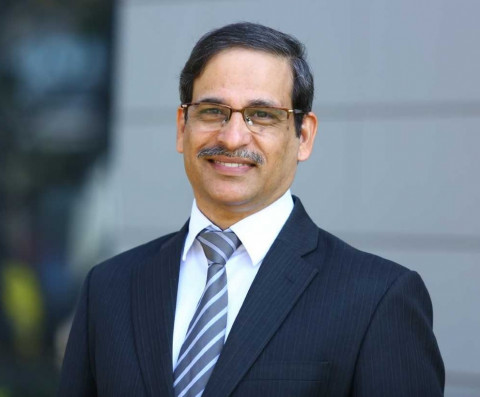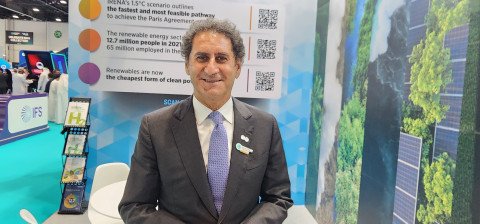Innovative and customized e-mobility tech solutions to enhance EV adoption
The Indian automotive market provides a huge opportunity for the adoption of EVs. Innovation and customization will play important role in further enhancing the uptake. Mr. Chandra Natarajan, Managing Director, Vector Informatik India Pvt. Ltd shares with Moulin Oza-Assistant Editor-ETN, his views on the emerging e-mobility sector and the importance of customized technology solutions.
Please tell our readers about Vector Informatik India and its offerings in the automotive sector?
Vector offers development tools, software, hardware, and ingenious solutions that simplify the development of automotive embedded systems. Our solutions are extensively used by engineers of automotive OEMs, Tier-1 suppliers, and other software organizations undertaking the development of automotive electronics.
With increased complexity in the automotive space and especially with the software running in cars, the development teams need to have an overview of their ideas being realized into technologies. There is a lot of toolchain and structure development, not to mention the standards that are being adopted. Vector is a part of several standardization groups and offers solutions across the complete Vth cycle of the automotive development process including system engineering, design, testing, validation, and calibration, which helps to simplify the processes of our customers.
To elaborate further, the ECU testing tools from Vector support the implementation of simulation and test environments efficiently. Regardless of the task in the development process, the Vector testing tools provide a scalable and re-usable solution from pure SIL simulations to HIL testing with functional acceptance tests – for all types of vehicles including internal combustion engine, a hybrid, or a purely electric vehicle. Similarly, for Calibration, we provide software & hardware solutions that covers all requirements throughout the entire development process, right from function development through bypassing and rapid prototyping solutions to test bench applications and test drives during trials and in series production.
For embedded software and systems, we provide software components, services, projects, and embedded hardware for creating embedded systems. The focus is on basic software and hardware solutions as a supplement to the application of our customers.
We also offer solutions to engineers in other application areas such as advanced driver assistance systems (ADAS), autonomous driving, connected vehicles, and electric vehicles. The company puts together solutions and provides customers with a toolchain to develop, test, calibrate and validate software that is being developed for such applications.
What kind of technology does the company provide for enhanced e-mobility? Please tell us about new areas of R&D as well?
Innovative solutions are becoming more available to allow electric mobility to enter the mass market. An important part of this is the charging technology. The term smart charging is used for charging systems of electric or hybrid vehicles according to ISO 15118, DIN SPEC 70121, SAE J2847/2. Vector supports developers of on-board charging ECUs in the vehicle, charging stations, and induction charging systems with extensive test systems and bespoke ECU software.
Another area of focus is connected vehicles, where Vector is looking at extending the domain beyond the car, at the areas where it can offer standardization. There is a large amount of data collected from the car when talking about connectivity, and the company is looking at cloud solutions in managing this data. This also brings us to Cyber Security, where OEMs & applied partners are analyzing if there is enough security of information inside the automobile. Vector has developed solutions related to remote updating of software, for which its understanding of the vehicle network is helping us to see how this can be connected with the IT world.
Autonomous Driving is another trend towards which Vector is carrying out development work, in partnership with BASELABS. BASELABs have algorithms related to ADAS for autonomous driving, and with Vector's calibration product line aligned to them, we have an entire package that supports both the development and validation of ADAS.
Apart from developing innovations based on market trends, Vector is also working on identifying the challenges that a customer could face in the future in the context of these trends and is working as a partner with the customers to overcome these challenges.
How does Vector Informatik support the developers of on-board charging ECUs in the vehicle, charging stations, and induction charging systems?
As we discussed, we at Vector support developers of on-board charging ECUs in the vehicle, charging stations, and induction charging systems with extensive test systems and bespoke ECU software. This helps them to develop their software quickly and cost-effectively.
Using the Vector test solution for smart charging, you can test onboard charging ECUs without having to operate a real charge spot. vTESTstudio is our authoring tool or test designing whereas CANoe. Ethernet is the ideal development and test tool for the development of ECUs and charge spots for smart charging. The CANoe Test Package EV is a library of powerful test cases which is used to test conformance and interoperability of electric vehicles (EV) within the international standards CCS and GB/T. Finally for testing the charging communication, we offer VT System which is a scalable and modular system for efficient HIL testing.
For the rapid development of on-board charging ECUs, Vector offers the software stack MICROSAR.CHARGE. The stack already contains the entire protocol stream of smart charging according to ISO 15118, DIN SPEC 70121, and SAE J2847/2. MICROSAR.CHARGE also supports the standards GB/T 27930 and CHAdeMO.
Vector and CSM together offer a very powerful and flexible e-mobility measurement solution for measurements in high-voltage cables and components.
We also offer versatile controller vSECC for smart double dispensers and pantograph charging stations. vSECC and vSECC.single are universal controllers for intelligent wallboxes and fast-charging stations and serve as a communication interface between the electric vehicle, the charging and load management system, and the power electronics. With vSECC, two charge points of different standards can be operated simultaneously, ideal for public high-power chargers. vSECC. single is particularly suitable for single charge points and wallboxes.
vCharM is out charging station management software for fleet operators, e.g., bus depots or company vehicle pools. The scalable feature-based software can be tailored depending on your application while staying completely independent from charging station manufacturers by supporting all current OCPP versions.
India is an emerging market for customized e-mobility technology solutions. In your view, what kind of opportunities/challenges exist within the same?
E-mobility is catching up quickly in our country and we are seeing innovative offerings across segments including two-wheelers, passenger vehicles, and commercial vehicles. The Indian automotive market provides a huge opportunity for the adoption of EVs and recently, we have seen a foray of new launches on both the two-wheeler and passenger vehicles which will further augur well for the industry.
As for the customized solutions, we are already seeing customization being offered to customers which will aid the adoption further. The two-wheeler buyers now no longer must worry about the range their electric vehicles will travel as they can now choose these based on their usage. I believe we will see this flexibility being offered to the passenger vehicles too in time. Also, the technological development on battery management will surely aid this effort.
Another vast opportunity is the charging stations' setup across the country, especially fast charging. Many of our customers are already working on providing the solutions which will develop a robust eco-system for electric vehicles in India.
Innovation is the key to the development of new technologies. What kind of technology innovation will further advance the automotive sector? Please elaborate
Innovations have been at the front end in the last decade and will continue to see further progress in the current one as well.
Electric Vehicles and technology for those vehicles will form a major part of advancements in the future. Testing processes and devices for EVs will also be another offshoot from EV technology which will drive the future of mobility.
Battery enhancement and cost per KW of energy will continue to remain in focus. Charging and disposal of batteries will pose further challenges in addition to the lifecycle costs to generate and mine, process, utilize and dispose of precious metals.
As the vehicles become more connected and a holistic ecosystem gets developed, cyber security will be prominent, and we can expect to see many advancements and new developments in that field.
What are your plans for further expanding your tech offerings and the development of next-gen technology?
We continue to work closely as partners with customers to identify the new areas which will drive the future of mobility. The trends we discussed earlier including E-Mobility, Connectivity, Cyber Security & ADAS are going to be prominent in near future and we continue to develop solutions focused on these. There is a good amount of work going on towards the development of new connectivity-related technologies, as well as in cloud solutions. A lot of the research is being undertaken on identifying the appropriate connectivity technologies for vehicle networks.



















